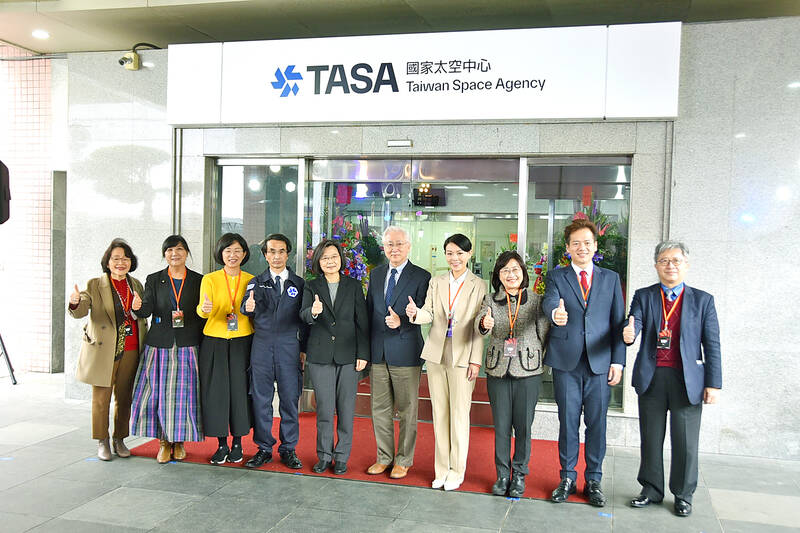The national space agency yesterday officially changed its name to the Taiwan Space Agency (TASA), after it was earlier this week upgraded and placed under the purview of the Cabinet-level National Science and Technology Council.
The Hsinchu City-based entity, previously called the National Space Organization, was renamed to include “Taiwan,” as this would improve readability and international recognition, the council said.
“The reorganization is a very important milestone for the country’s space development” as domestic technology would now receive more international recognition, President Tsai Ing-wen (蔡英文) said at the rebranding ceremony.

Photo: Wu Po-hsuan, Taipei Times
She said after the reorganization, TASA would be tasked with additional assignments, such as working with the Ministry of Economic Affairs to upgrade the nation’s space industry and working with the Ministry of Education to train space industry talent.
To seize international business opportunities, “we have been preparing to install ourselves in space. Taiwan’s 30 years of development of space technology and its accumulated results in the research and development of satellites have given it an excellent track record,” Tsai said.
TASA Director-General Wu Jong-shinn (吳宗信) told reporters that the reorganization would give the agency access to additional resources.
Taiwan’s advantage in space development is that it has the necessary fundamentals and has reached the stage at which is develops its own components, Wu said.
TASA, which currently employs about 200 people, is planning to recruit about 300 new staff over the next three years, Wu added.
“The restructuring also allows for a raise in salaries, which will be more attractive compared with the past,” he said.
The restructuring was implemented on Jan. 1 in accordance with the Act for the Establishment of the Taiwan Space Agency (國家太空中心設置條例), which was promulgated on May 4 last year.
The upgraded status aims to enhance national space technology research and development capabilities, implement national space strategies and plans, and promote the development of space activities and the space industry, the act says.
Originally established in 1991 as the National Space Program Office of the National Space Technology Long-Term Development Program, the entity became part of the National Applied Research Laboratories in 2003 and renamed the National Space Organization in 2005.
Since 1999, the agency has seen the launch of the Formosat-1, Formosat-2, Formosat-3, Formosat-5 and Formosat-7 satellites.
The Formosat-5 and Formosat-7 constellations are still in service, while Formosat-8, a constellation of six high-resolution optical remote sensing satellites, is to be launched next year and in 2025.
The TRITON (Wind-Hunter Satellite) is to be launched this year as part of an effort to research air-sea interaction and predict the intensity of typhoons, Wu said.
“Through a GPS receiver we can measure the height of the waves in the sea and calculate the speed of the wind, which is very important for our daily weather predictions,” Wu said.

POSITIVE DEVELOPMENT: Japan and the US are expected to hold in-depth discussions on Taiwan-related issues during the meeting next month, Japanese sources said The holding of a Japan-US leaders’ meeting ahead of US President Donald Trump’s visit to China is positive news for Taiwan, former Japan-Taiwan Exchange Association representative Hiroyasu Izumi said yesterday. After the Liberal Democratic Party’s landslide victory in Japan’s House of Representatives election, Japanese Prime Minister Sanae Takaichi is scheduled to visit the US next month, where she is to meet with Trump ahead of the US president’s planned visit to China from March 31 to April 2 for a meeting with Chinese President Xi Jinping (習近平). Japan and the US are expected to hold in-depth discussions on Taiwan-related issues during the

‘LIKE-MINDED PARTNER’: Tako van Popta said it would be inappropriate to delay signing the deal with Taiwan because of China, adding he would promote the issue Canadian senators have stressed Taiwan’s importance for international trade and expressed enthusiasm for ensuring the Taiwan-Canada trade cooperation framework agreement is implemented this year. Representative to Canada Harry Tseng (曾厚仁) in an interview with the Central News Agency (CNA) said he was increasingly uneasy about Ottawa’s delays in signing the agreement, especially as Ottawa has warmed toward Beijing. There are “no negotiations left. Not only [is it] initialed, we have three versions of the text ready: English, French and Mandarin,” Tseng said. “That tells you how close we are to the final signature.” Tseng said that he hoped Canadian Prime Minister Mark Carney

President William Lai (賴清德) yesterday bestowed one of Taiwan’s highest honors on Saint Vincent and the Grenadines (SVG) Ambassador Andrea Clare Bowman in recognition of her contributions to bilateral ties. “By conferring the Order of Brilliant Star with Grand Cordon on Ambassador Bowman today, I want to sincerely thank her, on behalf of the Taiwanese people, for her outstanding contribution to deepening diplomatic ties between Taiwan and SVG,” Lai said at a ceremony held at the Presidential Office in Taipei. He noted that Bowman became SVG’s first ambassador to Taiwan in 2019 and

A man walks past elementary school artworks at the Taipei Lantern Festival in Ximen District yesterday, the first day of the event. The festival is to run from 5pm to 10pm through March 15.